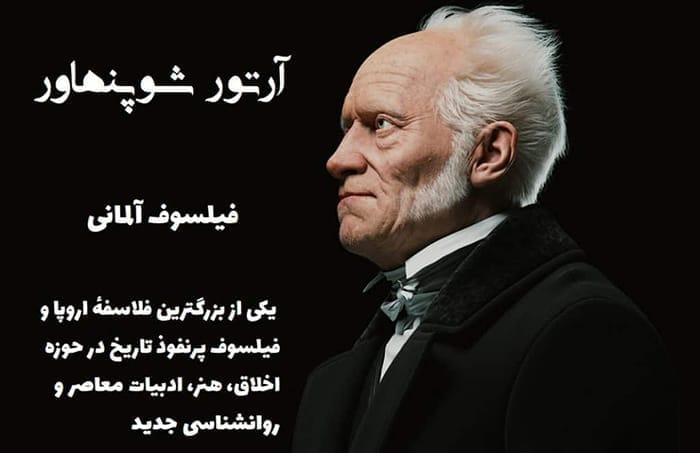
Blog
Arthur Schopenhauer

Humans have always strived to improve their lives and make living easier. In this context, philosophers and theorists have examined issues related to human happiness and misery, offering solutions to these problems. One such philosopher is Arthur Schopenhauer, who, with his unique worldview, is recognized as a philosopher of pessimism.
Schopenhauer looked at human issues through a different lens compared to the prevailing philosophical currents of his time. Rather than focusing on happiness, he chose to explore human misery and suffering. His goal was to guide humanity toward happiness and well-being by understanding and confronting its inherent suffering. In other words, Schopenhauer used the method of reductio ad absurdum (arguing by contradiction) to present an alternative view of the world and life, which ultimately earned him the title of the “philosopher of pessimism.”
However, Schopenhauer’s theories and views continue to be some of the most engaging and thought-provoking topics in philosophy. Reflecting on his ideas provides intriguing perspectives and opens up rich avenues for philosophical discussion and exploration.
فهرست عناوین
ToggleBiography of Schopenhauer
Arthur Schopenhauer, a 19th-century German philosopher, was born on February 22, 1788, in Danzig (now Gdansk, Poland). He was born into a wealthy family and continued his studies at the University of Göttingen and the University of Berlin. Schopenhauer is recognized as one of the greatest German philosophers and made significant contributions to Western philosophy.
Schopenhauer’s works, including “On the Communication and Mental Superstitions” and “The Art of Keeping Up Appearances”, are considered some of his most prominent philosophical contributions. He is regarded as one of the founders of idealism and explored concepts such as “will” and “suffering” in his works.
Schopenhauer’s works, including “On the Communication and Mental Superstitions” and “The Art of Keeping Up Appearances”, are considered some of his most prominent philosophical contributions. He is regarded as one of the founders of idealism and explored concepts such as “will” and “suffering” in his works.

Schopenhauer’s Theories
In this article, we aim to explore some of the philosophical theories of this renowned philosopher:
Self-Knowledge in Solitude
Arthur Schopenhauer’s advice for achieving human happiness is to find oneself in solitude. He emphasizes that in order to enjoy life and benefit from it, one must first discover themselves in solitude. This does not mean withdrawing from social interactions, but rather creating a suitable distance from others to provide an opportunity for self-reflection and self-empowerment. In other words, a person must define themselves independently and directly, rather than through the lens of others. This approach helps individuals understand their identity and value, gaining a deeper comprehension of themselves. The ability to accept and experience solitude is of great importance for human beings. According to Schopenhauer’s theory, individuals who fear solitude may struggle to enjoy it for reasons such as a lack of self-esteem or a fear of emotional pain. In other words, self-awareness can help individuals better identify their strengths and abilities, leading to a deeper understanding of themselves.
Physical and Mental Health
The next issue that Schopenhauer emphasizes is health. According to Schopenhauer, the most important factor for humans is their health. He argues that all the necessary conditions for achieving happiness are summarized in the physical and mental health of an individual.
If you are not healthy, both mentally and physically, you will not have the essential foundation for happiness. Schopenhauer even uses a proverb to illustrate this: “A poor but healthy person who has nothing is far happier and more fortunate than a king who is bedridden with illness.”
An interesting point to note is that the common ground in the philosophy of many thinkers, including Schopenhauer, is the focus on the health of the mind and body, and they do not see happiness as dependent on wealth. According to Schopenhauer, before one can seek the meaning of life, they must first focus on their own health.
Suggested article: Health Psychology
The Unconscious
The next concept Schopenhauer stresses is the understanding of the unconscious. He believes that we must try to understand our unconscious mind. When we have thoughts, emotions, and feelings that are not expressed or understood, they tend to move toward the unconscious and settle there, becoming part of our unconscious over time. Schopenhauer argues that by understanding our unconscious mind, we can solve many problems and concerns by properly comprehending them.
Understanding the unconscious is a fundamental concept in psychology and philosophy that refers to the depth and complexity of the human mind. This part of the mind consists of thoughts, emotions, and desires that operate unconsciously and have a significant impact on human behavior and decision-making.
Exploring the unconscious and understanding it deeply allows individuals to delve into the depths of their existence and become aware of their hidden and more complex aspects. Schopenhauer strongly emphasizes that understanding the unconscious is the key to solving many mental and psychological problems. Since the unconscious influences behavior and decision-making, recognizing it can help individuals better cope with their concerns and enhance their personal growth.
Suggested article: Psychoanalysis
Reasonable Expectations
The next issue that Schopenhauer addresses is the effort to reduce one’s expectations. This concept is not only relevant to Schopenhauer but also ties back to Stoic philosophy and even earlier traditions, extending across a long history. In Stoic philosophy, it is mentioned that when you raise your expectations and fail to meet them, the more you elevate your expectations, the greater the likelihood of failure, and after failure, feelings of hopelessness and frustration increase.
You must set your goals with realism to prevent problems from arising.
We live in an era that is vastly different from Schopenhauer’s time. Artificial needs have significantly increased. Do we really need all these luxuries? Is it necessary to follow everything that is discussed on social media? The best way to think is to have a correct perspective on your own life. In other words, when you ask yourself why you have this style of clothing or why you chose this lifestyle, you should be able to defend your viewpoint using philosophical reasoning, not just follow the crowd because everyone else is doing it. Otherwise, you are simply a mimic and lack original thought and creativity. Therefore, you must trust your own rationality and make decisions based on your personal values and beliefs. You should strive to live life on your own terms.
The Art of Argument
In his book On the Wisdom of Life, Arthur Schopenhauer discusses the topic of debate and argument concerning thought and knowledge. He emphasizes that individuals seeking knowledge and understanding should not engage in debates with others on these matters. This advice is given because the time and energy a person spends on learning and understanding a subject are extremely valuable, and arguing with people who do not have sufficient experience or knowledge in the field may lead to wasting the time and energy of the person trying to study.
This topic is also addressed in his book The Art of Being Right, where Schopenhauer stresses the importance of avoiding debates on scientific and philosophical matters. The book advises readers to focus on deep reflection and learning from scientific and philosophical texts, rather than engaging in discussions with ignorant individuals or pursuing trivial arguments, so that they may achieve more meaningful and beneficial results.
Eliminate Your Suffering to Be Happy
Schopenhauer addresses the concept that happiness and pleasure for humans are relative concepts, shaped by their perceptions and personal definitions. He asserts that having wealth and material possessions may not necessarily lead to happiness, while another individual with fewer resources may live a better life. Therefore, Schopenhauer believes that happiness is not dependent on the amount of assets or possessions one has, but rather on one’s perspective and attitude toward life. In other words, happiness and well-being are based on an individual’s definition and valuation of life and various situations. According to Schopenhauer’s theory, happiness is defined by the absence of suffering, meaning that a person realizes they are happy when they are not suffering. Schopenhauer also addresses the concept of the fear of loss and life’s motivations, stating that achieving a balance between fear and desire can help individuals achieve greater success.
Suggest article: Psychology Clinic

Works of Arthur Schopenhauer
Some of the notable works of Arthur Schopenhauer include:
- Fears and Superstitions of the Mind
- The Art of Growing Old
- The Art of Maintaining One’s Dignity
- The Art of Survival
- The Art of Offending
- The Art of Dealing with Women
- The Art of Happiness
- The World as Will and Representation
- The Art of Always Being Right
- On the Wisdom of Life
- The World and the Reflections of the Philosopher
- Two Fundamental Problems of Ethics
- The Fourfold Root of the Principle of Sufficient Reason
- The Art of Self-Knowledge
- On the Nature of Human Beings
- Addenda and Supplements
- Ethics, Law, and Politics
- This Is How Life Is
Final Words
In personal and social development, being aware of the correct beliefs is of great importance. For growth and progress, it is essential to familiarize oneself with one’s own knowledge and abilities and act according to one’s philosophical and cultural principles. This approach not only increases motivation but also fosters commitment and perseverance in various aspects of life. If you have a clear logic and philosophy behind your actions, even if you do not reach your final goal, you will certainly not become discouraged and will continue to move forward in your personal growth and development.
برای مشاوره رایگان و رزرو وقت (یا اگر تماس گرفتید و قادر به پاسخگویی نبودیم) شماره تماس خود را وارد کنید. ما به زودی با شما تماس می گیریم!



